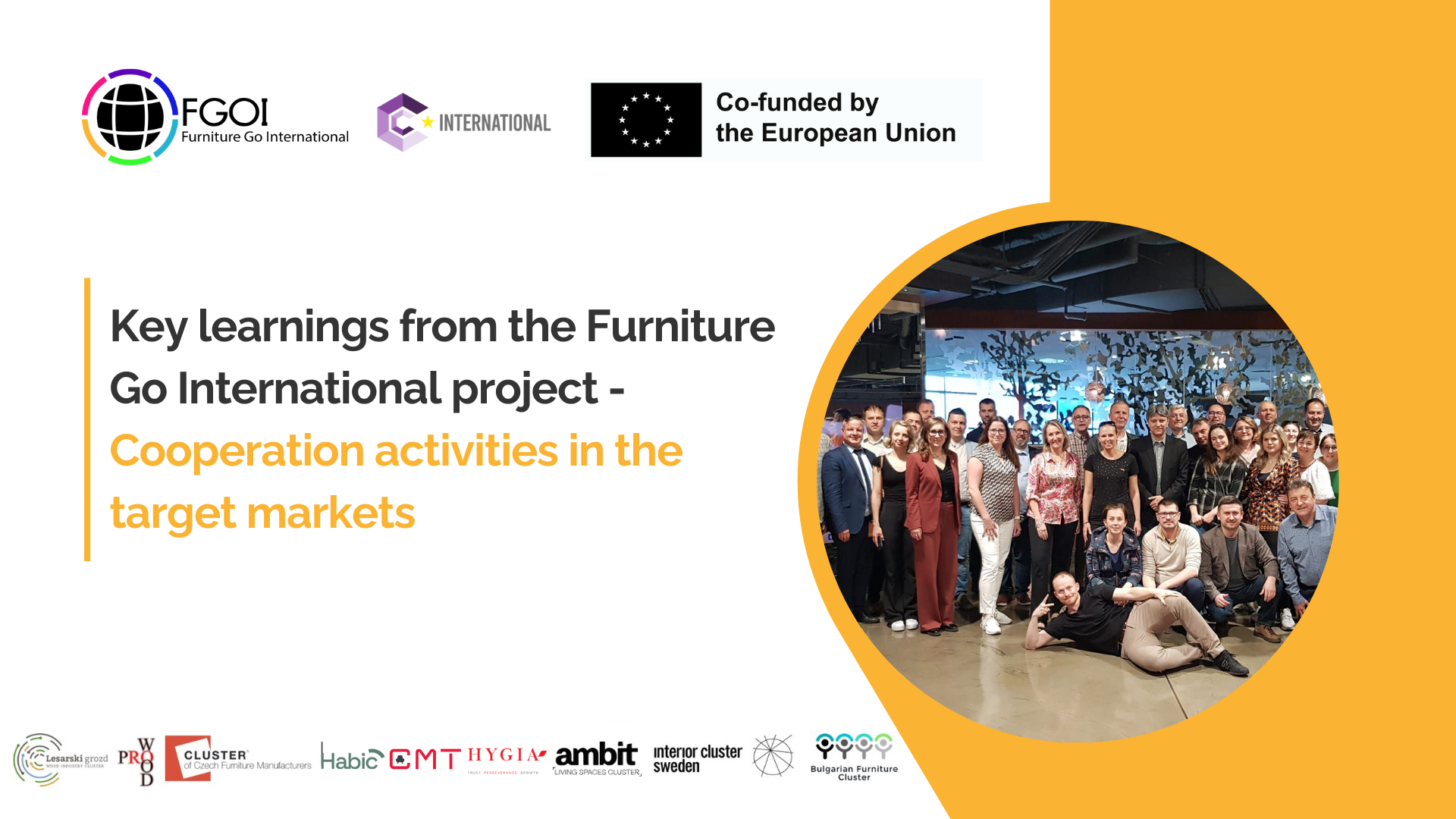
The collaboration of eight European clusters from Romania, Spain, Slovenia, Czech Republic, Sweden, and Bulgaria represents a significant initiative aimed at fostering industrial growth, entrepreneurship, and cross-border business opportunities. This article explores the Furniture Go International project, detailing its strategies, and case studies that highlight both successes and challenges in the pursuit of global market expansion.
The Partnership
The Furniture Go International consortium involves eight clusters from across the continent (Romania, Spain, Slovenia, Czech Republic, Sweden, and Bulgaria), working together to promote industrial growth and transformation within the furniture sector. The initiative focuses on creating new business opportunities in markets such as the USA, Canada, South Africa, and Egypt, while also fostering mutual trust and the transfer of knowledge among European SMEs. This partnership underscores the collective commitment to expanding the reach of European furniture businesses, helping them to navigate the complexities of international markets.
Why the creation of a Furniture Go International consortium?
Traditions: With a rich cultural heritage and a comprehensive value chain, Europe’s furniture industry boasts a long history of craftsmanship.
Excellence: Advanced production technologies characterize the industry, which also embraces sustainability as a core value.
Export Potential: There is growing global demand for mid and high-end European furniture products, which are valued for their quality and added value.
While many project partners have established contacts in the USA, other markets like Canada, South Africa, and Egypt remain less explored. These regions offer potential growth opportunities, though they come with the challenge of limited existing contacts and sporadic sales activities.
Study Cases for Learning Activities
Reflecting on the outcomes of internationalization efforts is crucial for any organization seeking to expand internationally. By assessing both successes and failures, the consortium aims to refine strategies and make informed decisions for future endeavors.
- Leading partner – AMBIT: Working Group on Internationalization
The AMBIT working group exemplifies the consortium’s proactive approach to internationalization. Regular meetings are held every two months, bringing together 10 companies to assess new activities, such as identifying relevant fairs and unexplored markets. Workshops are also organized for companies that do not participate in FGOI missions, ensuring that valuable information, updates, and opportunities are shared across the group.
Meet & Share USA
This initiative encourages cluster members to share their experiences in the U.S. market, offering insights into the challenges and opportunities. Notable case studies include companies participating in events such as the International Contemporary Furniture Fair (ICFF) in New York and a Toronto showcase. This exchange of knowledge supports companies in navigating the complexities of the U.S. market.
Meet & Share Middle East: Egypt
Focusing on the Egyptian market, this initiative provides a platform for companies like Grassoler and Kintsugi to share their experiences. With 20 companies participating, the initiative identifies promising areas for internationalization, including Saudi Arabia, the UAE, and Egypt. A mission to Cairo Design Week in November 2023 further illustrates the consortium’s commitment to exploring new markets.
- Leading partner – HABIC’s Strategic Showroom in New York
The HABIC cluster’s collaboration with three partner companies (ISIMAR, NOVADECOR, and BLUX) in establishing a New York showroom highlights the importance of strategic alliances. HABIC provided critical support in identifying market opportunities and recruiting personnel, emphasizing the power of synergy and collaboration.
- Leading partner – Interior Cluster Sweden: Expanding into the U.S. Market
Interior Cluster Sweden (ICS) played a pivotal role in supporting companies like ESSEM DESIGN and STOLAB. Through well-organized networking trips and assistance in supplier discovery, ICS demonstrated how clusters can act as catalysts for market entry and business growth.
- Leading partner – KCN: Czech Furniture Manufacturers Targeting North America
The KCN cluster supported the Czech company TZÚ in obtaining BIFMA membership, essential for entering the U.S. and Canadian markets. KCN’s efforts also included a comprehensive study analyzing market conditions, technical and legislative requirements, and trends, providing valuable insights for its members.
- Leading partner – TFC: Challenges in Establishing a Joint Showroom in Egypt
A proposed joint showroom in Egypt, involving four clusters, ultimately failed due to disagreements over management responsibilities and financial involvement. This case underscores the importance of clear agreements and shared commitment in collaborative ventures.
A significant success was achieved through the signing of a Memorandum of Understanding (MoU) between ANTARES Romania and the ATICO Factory, part of the Arab Organization for Industrialization. This partnership aims to establish a manufacturing plant in Egypt focused on producing ergonomic office chairs, conference and visitor chairs, sofas, and other seating solutions.
- Leading partner – WIC Slovenia: Supporting Market Access in Canada
The Wood Industry Cluster Slovenia facilitated market access for companies targeting Canada, providing essential information, organizing business networks, and securing long-term support from the Slovenian government. This initiative exemplifies how clusters can offer sustained assistance during the early stages of market entry.
Main Objective and Strategic Goals
The overarching objective of the Furniture Go International Consortium is to support European SMEs in becoming dynamic and competitive players on the global stage. This involves helping SMEs capable of internationalization reach new markets, intensifying cross-border networks, and promoting a pan-European strategic cluster partnership. By establishing key contact points beyond the European Union, the consortium aims to strengthen European industry’s global presence.
How FGOI has improved SMEs’ Competitiveness
Cooperation: Preparing European furniture manufacturers to access non-EU markets like the USA, Canada, Egypt, and South Africa through closer cooperation.
Nurturing: Equipping SMEs with the necessary resources, skills, and knowledge to enter new markets.
Networking: Consolidating inter-regional cluster collaboration and building strategic global partnerships with entities like consulates and embassies.
Business Growth: Implementing tailored actions to unlock positive opportunities for 40 SMEs, helping them access new markets.
Boosting Exports: Developing viable business agreements between SMEs and new markets during the first 24 months of the project.
Cross-cultural Experience: Organizing economic missions, best practice exchanges, international events, and extracting stakeholder feedback.
Main Learnings
The consortium’s efforts have highlighted several key learnings:
Establishing New Connections: The initiative has facilitated new relationships with clusters, associations, and other stakeholders in target countries.
Joint Representation: While challenging, it was not impossible, as shown in the case of US market
Continuity: Ensuring the continuity of these efforts requires identifying additional funding sources and maintaining active networks.
Conclusion
Through strategic partnerships, shared knowledge, and targeted initiatives, European furniture manufacturers are not only enhancing their competitiveness but also paving the way for future growth in international markets. The consortium’s work serves as a model for other industries seeking to navigate the complexities of internationalization and underscores the importance of collaboration in today’s interconnected world.


